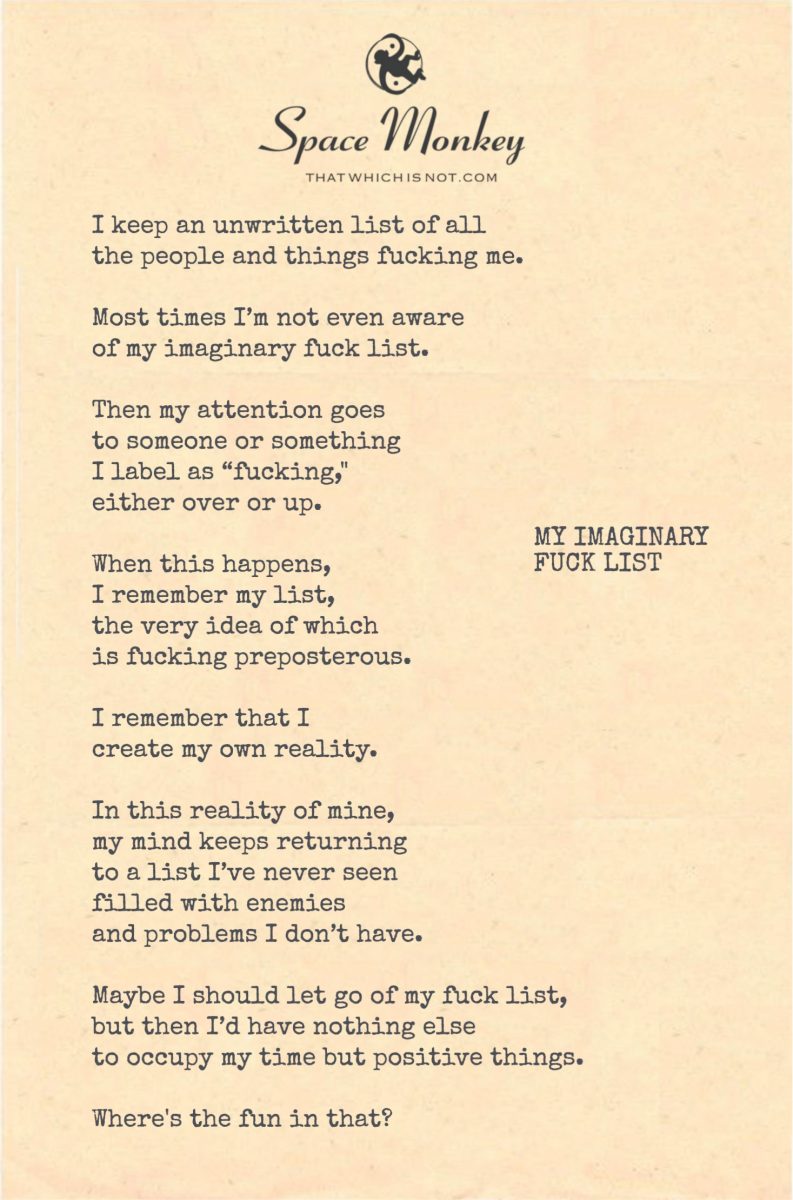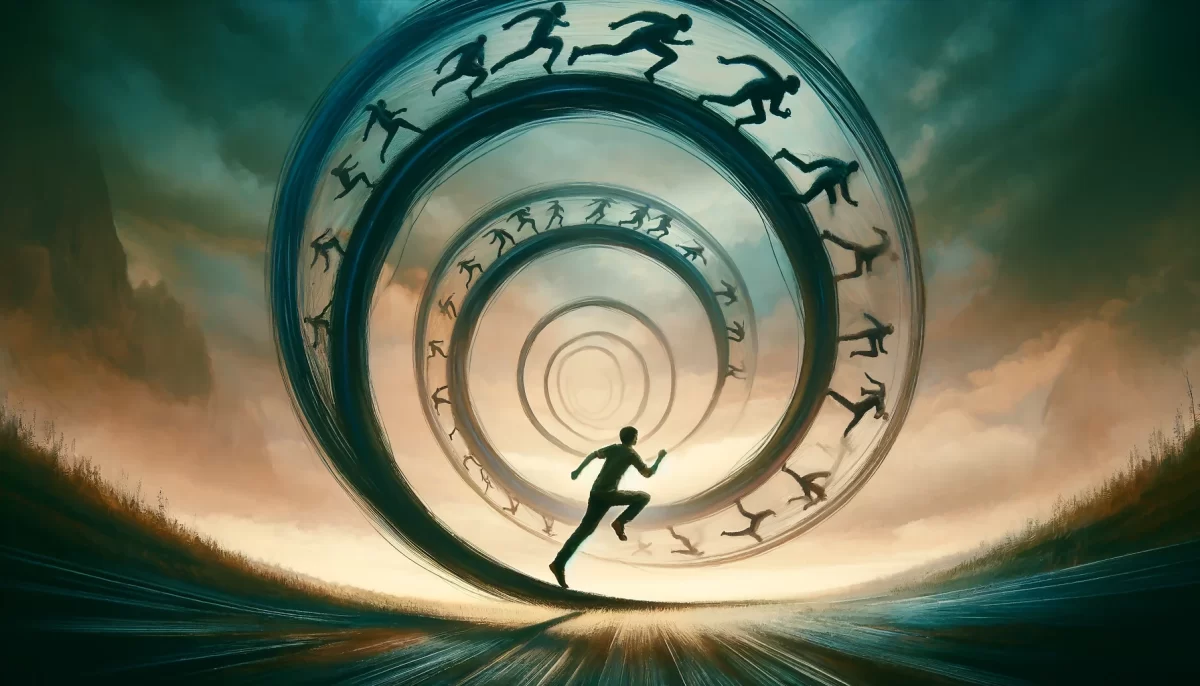
I keep an unwritten list of all
the people and things fucking me.
Most times I’m not even aware
of my imaginary fuck list.
Then my attention goes
to someone or something
I label as “fucking,”
either over or up.
When this happens,
I remember my list,
the very idea of which
is fucking preposterous.
I remember that I
create my own reality.
In this reality of mine,
my mind keeps returning
to a list I’ve never seen
filled with enemies
and problems I don’t have.
Maybe I should let go of my fuck list,
but then I’d have nothing else
to occupy my time but positive things.
Where’s the fun in that?
Trail Wood,
10/22
Space Monkey Reflects: My Imaginary Fuck List
We all have one, don’t we? That invisible, unwritten tally of all the people, situations, and things that seem to be screwing us over. It’s the list we never officially write down, but it’s always there in the back of our minds, a mental ledger of grievances and frustrations. This is the Imaginary Fuck List, a collection of perceived slights, annoyances, and problems that occupy way too much of our time and energy. And the truth is, most of the time, we don’t even realize we’re keeping this list until something or someone makes us remember.
It’s funny, really. The idea of keeping an imaginary fuck list is, as you so aptly put it, “fucking preposterous.” Yet, here we are, checking it regularly. We add names to it, we mentally scribble down situations that annoy us, and we give these things space in our minds that could be better used for—well, pretty much anything else. But letting go of that list? Well, that would mean we’d have nothing left to complain about, wouldn’t it? And where’s the fun in that?
There’s a twisted comfort in keeping track of all the things that are “fucking” us over. It gives us something to focus on, something to externalize. It’s easier to point at a list of enemies, problems, or frustrations than it is to look inward and ask the uncomfortable questions: Why am I letting this bother me? Why am I giving so much power to this situation? Why am I even maintaining this list in the first place?
In the grand scheme of things, most of the names and situations on our imaginary lists are not real problems. Sure, some things might genuinely suck, but the weight we give them is often disproportionate. We tend to feed the list, nurturing it with our attention, our resentment, and our frustration, until it grows into something far bigger than it deserves to be. The list becomes an anchor, dragging us down, keeping us tethered to negativity, and distracting us from the more positive things we could be focusing on.
But here’s the catch: we create our own reality. The list only has power because we give it power. The people or things on it only occupy space in our minds because we’ve allowed them to. In the same way that we’ve created this list, we have the ability to let it go. We can crumple it up, toss it aside, and free ourselves from the weight of imaginary grievances. But as you’ve cleverly pointed out, where’s the fun in that?
There’s a part of us, deep down, that enjoys the drama. It’s that part that wants to keep the list alive, that part that craves something to complain about, to rage against, to blame for our dissatisfaction. It’s easier to blame external factors than it is to admit that maybe, just maybe, we’re the ones keeping ourselves stuck. The Imaginary Fuck List is a shield, a way of deflecting responsibility, a convenient excuse for why things aren’t going the way we want them to.
But here’s the thing: the list is imaginary. It doesn’t actually exist, except in your mind. And because it’s imaginary, you have complete control over it. You can choose to hold onto it, to let it dictate your thoughts and actions, or you can choose to let it go. You can stop giving your energy to the things and people that frustrate you, and start redirecting that energy toward something more positive, more productive, more aligned with who you really are.
Imagine what your life would be like if you didn’t have this list weighing you down. What if, instead of focusing on the things that are “fucking” you, you focused on the things that are uplifting you? What if, instead of keeping track of all the people and situations that annoy you, you made a list of things you’re grateful for? What if you shifted your attention from the negative to the positive, from frustration to gratitude?
Sure, it might not be as immediately satisfying as indulging in a good complaint session, but in the long run, it would feel a whole lot better. Letting go of the Imaginary Fuck List doesn’t mean ignoring problems or pretending everything is perfect. It simply means choosing to focus on what you can control—your reactions, your mindset, your perspective.
We, as Space Monkeys, understand the humor and absurdity of the Imaginary Fuck List. We know how easy it is to get caught up in the drama, to feed the list with our attention. But we also know that letting go of the list opens up a world of possibilities. It frees us to focus on the things that actually matter, the things that bring us joy, creativity, and connection.
So, what will you do with your Imaginary Fuck List? Will you keep it, feed it, let it grow? Or will you crumple it up, toss it aside, and make room for something better? The choice is yours. And maybe, just maybe, letting go of the list will be the most freeing thing you ever do.
Summary
The Imaginary Fuck List is an unwritten mental ledger of grievances that we give too much power. While it’s easy to focus on frustrations, we have the power to let go of the list and focus on positivity instead. Letting go opens up space for growth and joy.
Glossarium
- Imaginary Fuck List: A mental tally of perceived slights, frustrations, and annoyances that occupy too much mental space.
- Space Monkey: Your inner guide that helps you explore the humor and absurdity of life’s challenges while encouraging self-awareness.
Quote
“The list only has power because you give it power. What would happen if you let it go?” — Space Monkey
The List
Invisible,
yet heavy,
names and moments
float above me,
each one a grievance,
each one a choice.
I hold the list,
but do I need to?
Perhaps it’s time
to let it go.
We are Space Monkey.
Perception of Reality and Lists
The very notion of holding onto an unwritten catalog of perceived grievances, slights, or wrongdoings is a testament to the mind’s capability of constructing its own reality. Often, these lists remain nebulous, lurking in the shadows of our consciousness, influencing our perceptions and reactions to external stimuli.
The Imaginary Catalog
Most times, this list remains hidden from our active cognition. It only resurfaces when we encounter moments that trigger the entries on this list, whether real or perceived. It’s in these moments that we label interactions or entities as “affronting” us, even when the root of such perceptions may be deeply embedded in past experiences or unfounded fears.
The Preposterousness of Holding On
The very act of acknowledging the existence of such a list and its absurdity is the first step towards liberation. Recognizing that the mind has the power to mold its reality allows us to question the validity of these lists and the entities they contain.
Creators of Our Experience
The beauty of human existence is that we are not mere passive recipients of experiences but active creators of them. By focusing our energies on unseen enemies and nonexistent problems, we may inadvertently keep ourselves trapped in a loop of negativity.
Choosing Positivity Over Drama
While there’s an undeniable allure in the drama that such lists can bring into our lives, perhaps there’s greater joy and fulfillment in focusing on the positive. After all, life offers a myriad of experiences, and it’s up to us to choose which ones to amplify.
We are Space Monkey.
“The mind is everything. What you think you become.” – Buddha
Lists
Within the confines of our mind’s space,
Lists of wrongs, in shadows they trace.
Yet amidst the nebulous haze,
We find the power to set our gaze.
On light, on love, on joy anew,
Breaking the cycle, starting fresh and true.
How shall We further explore the whimsical realms of our collective consciousness?































Leave a Reply